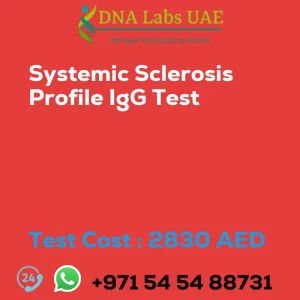INTERLEUKIN-2 RECEPTOR ALPHA CHAIN IL-2R Test
Test Name: INTERLEUKIN-2 RECEPTOR ALPHA CHAIN IL-2R Test
Components: IL-2R
Price: 4550.0 AED
Sample Condition: 2 mL (1 mL min.) serum from 1 Red Top (No Additive) tube. Do not use SST gel barrier tubes. Separate serum within 1 hour of collection in a plastic transport vial and freeze immediately. Ship frozen. DO NOT THAW. Avoid Biotin supplements 48 hours prior to sampling. Duly filled Test Send Out Consent Form is mandatory.
Report Delivery: Sample by 7th of the month; Report after 2-3 weeks
Method: Immunoassay
Test type: Infections, Inflammation, Autoimmunity, Cancer
Doctor: Physician, Oncologist
Test Department: OS
Pre Test Information: Avoid Biotin supplements 48 hours prior to sampling. Duly filled Test Send Out Consent Form is mandatory.
Test Details:
The IL-2R test is a diagnostic test used to measure the levels of interleukin-2 receptor alpha chain (IL-2R) in the blood. IL-2R is a protein that is found on the surface of certain immune cells, including T cells and natural killer cells. The test is typically ordered to help diagnose and monitor certain autoimmune disorders, such as rheumatoid arthritis and systemic lupus erythematosus, as well as certain types of cancer, such as lymphoma and leukemia. Elevated levels of IL-2R in the blood may indicate an overactive immune system or the presence of certain diseases.
The test can help healthcare providers assess the severity of the condition, monitor the effectiveness of treatment, and detect any disease recurrence. The IL-2R test is usually performed by taking a blood sample from the patient. The sample is then sent to a laboratory for analysis. The results are typically reported as a numerical value, which is compared to a reference range to determine if the levels are within normal limits.
It is important to note that the IL-2R test is just one piece of the diagnostic puzzle and should be interpreted in conjunction with other clinical findings and tests. A healthcare provider will consider the patient’s medical history, symptoms, and other laboratory results to make an accurate diagnosis and develop an appropriate treatment plan.
| Test Name | INTERLEUKIN-2 RECEPTOR ALPHA CHAIN IL-2R Test |
|---|---|
| Components | |
| Price | 4550.0 AED |
| Sample Condition | 2 mL (1 mL min.) serum from 1 Red Top (No Additive) tube. Do not use SST gel barrier tubes. Separate serum within 1 hour of collection in a plastic transport vial and freeze immediately. Ship frozen. DO NOT THAW. Avoid Biotin supplements 48 hours prior to sampling.Duly filled Test Send Out Consent Formis mandatory. |
| Report Delivery | Sample by 7th of the month; Report after 2??3 weeks |
| Method | Immunoassay |
| Test type | Infections, Inflammation, Autoimmunity, Cancer |
| Doctor | Physician, Oncologist |
| Test Department: | OS |
| Pre Test Information | Avoid Biotin supplements 48 hours prior to sampling. Duly filled Test Send Out Consent Formis mandatory. |
| Test Details |
The IL-2R test is a diagnostic test used to measure the levels of interleukin-2 receptor alpha chain (IL-2R) in the blood. IL-2R is a protein that is found on the surface of certain immune cells, including T cells and natural killer cells. The test is typically ordered to help diagnose and monitor certain autoimmune disorders, such as rheumatoid arthritis and systemic lupus erythematosus, as well as certain types of cancer, such as lymphoma and leukemia. Elevated levels of IL-2R in the blood may indicate an overactive immune system or the presence of certain diseases. The test can help healthcare providers assess the severity of the condition, monitor the effectiveness of treatment, and detect any disease recurrence. The IL-2R test is usually performed by taking a blood sample from the patient. The sample is then sent to a laboratory for analysis. The results are typically reported as a numerical value, which is compared to a reference range to determine if the levels are within normal limits. It is important to note that the IL-2R test is just one piece of the diagnostic puzzle and should be interpreted in conjunction with other clinical findings and tests. A healthcare provider will consider the patient’s medical history, symptoms, and other laboratory results to make an accurate diagnosis and develop an appropriate treatment plan. |








